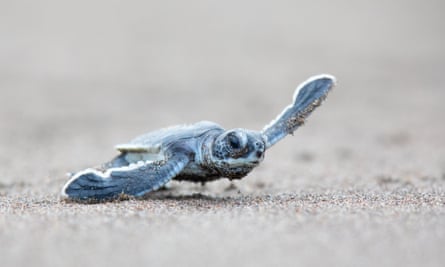
As a careers teacher in a secondary school, Jacqui Hodder tries to enlarge the world of possibilities for others. During lockdown, she was supervising a civic education class on Zoom, listening with her year nine students to a talk about the experience of volunteering with turtles. But it was Hodder herself who kept asking questions. “I was blown away,” she says.
The guest speaker showed a little video of her stay: the base camp, the tropical downpours, the remoteness all struck a chord with Hodder. “Straight away I knew that’s what I wanted to do,” she says.
Hodder, who lives in Victoria, Australia, was due long-service leave. So she researched the options and found the nonprofit Sea Turtle Conservancy. She had never volunteered before, nor travelled alone. A month in Costa Rica felt like a huge challenge.
“I had always been overweight and not that fit,” says the 61-year-old. Volunteers were required to walk 10 to 15km a night on soft sand. “So that was a big fear – whether physically I would be able to manage. I knew there would be lots of young people there.” At the time, she was approaching 60 and prediabetic. “I didn’t want to let them down, to be the one behind while everyone waited for me to catch up.”
She booked an appointment with a physiotherapist, who informed Hodder that she “needed to visit the gym three or four times a week for the rest of my life”. To cope with the soft sand, she would have to build her calf muscles and upper-body strength. “It sounds intense, but for me it was wonderful that the physiotherapist was so clear,” she says. The strictness felt like a prescription. “I said: ‘OK, great.’” She used weights and resistance bands, stretched and walked, and embarked on “an eating programme”.
Hodder avoids the word “diet” because “I’ve been on that cycle and it’s not a healthy cycle,” she says. She remembers being called fat as a child. As a result of her lifestyle changes, she dropped two dress sizes. “But the change came about for a really positive reason.”
Even so, as the time to leave approached last autumn, “it felt scary”, she says. Her husband and two adult children were supportive. But still, “I thought: ‘I don’t know if I can do this.’ I think I would have pulled the pin if I hadn’t booked everything and paid for everything. But I’m so glad I didn’t. I’m so glad I pushed myself.”
In Costa Rica, she says: “The world slowed down completely. Most of the action happened at night. The beach was so dark because the sand is black. I looked over and the moon was shining, and there was this dinosaur-like creature emerging, like a giant wet rock, from the sea.”
The job was: “Walk, stop, work the turtle. Walk, stop, work the turtle.” One part of “working the turtle” was to count the eggs, which “are like firm jelly. We had to reach in under the turtle as she was laying eggs into the sand. On one hand they are dropping in, and with the other you are clicking the counter. They drop three at a time, and lay about 100.”
When the green turtle had finished laying, Hodder had to “get into the pit with her and measure her” with callipers and a tape down her spine, before checking the shell for bites and barnacles. “They are big, heavy, powerful and so elemental.”
As for her worries about being older than the other volunteers: “I kept up,” she says. “They swept me into their embrace. It’s not always easy to feel a sense of belonging, especially as some people were 40 years younger than me.”
After a month in Costa Rica, it was a shock to readjust to teaching. “I remember walking to school and telling myself: ‘I’ve been to Costa Rica – I can do anything. I can go to a brand new country on the other side of the world and it’s OK.’”
Next time, Hodder hopes to stay longer. But for now, she is enjoying “the feeling of being strong in myself. I feel my calves and think: ‘These trousers are not going over those muscles; that’s pretty good!’ I’m springing up the stairs.”
Her new mantra is: “Be vigilant. I don’t want to go back to how I was.”



